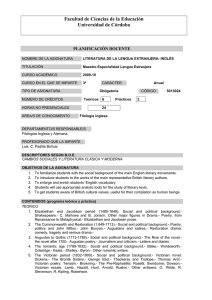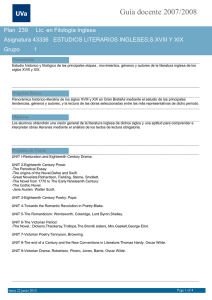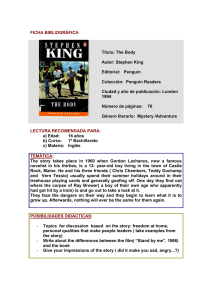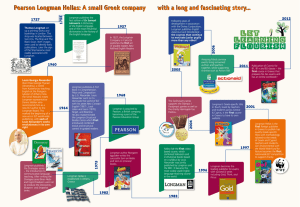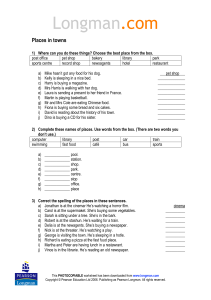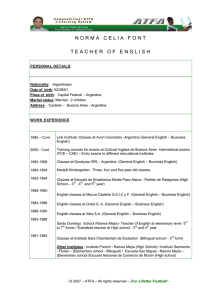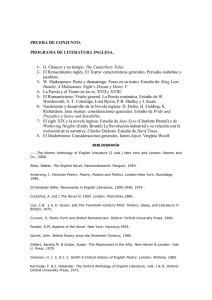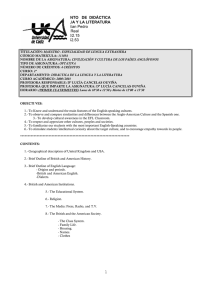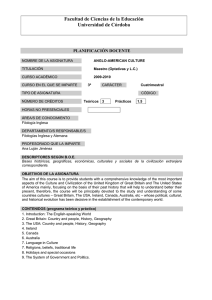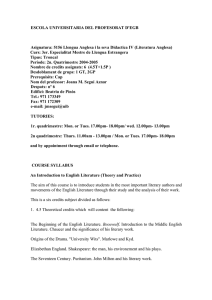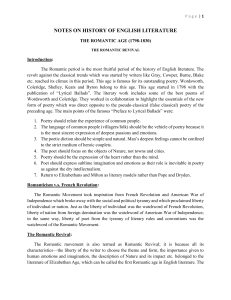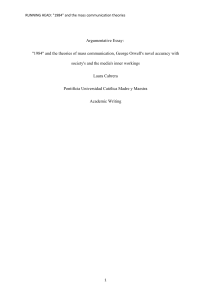FACULTAD DE HUMANIDADES Y CC EDUCACIÓN
Anuncio
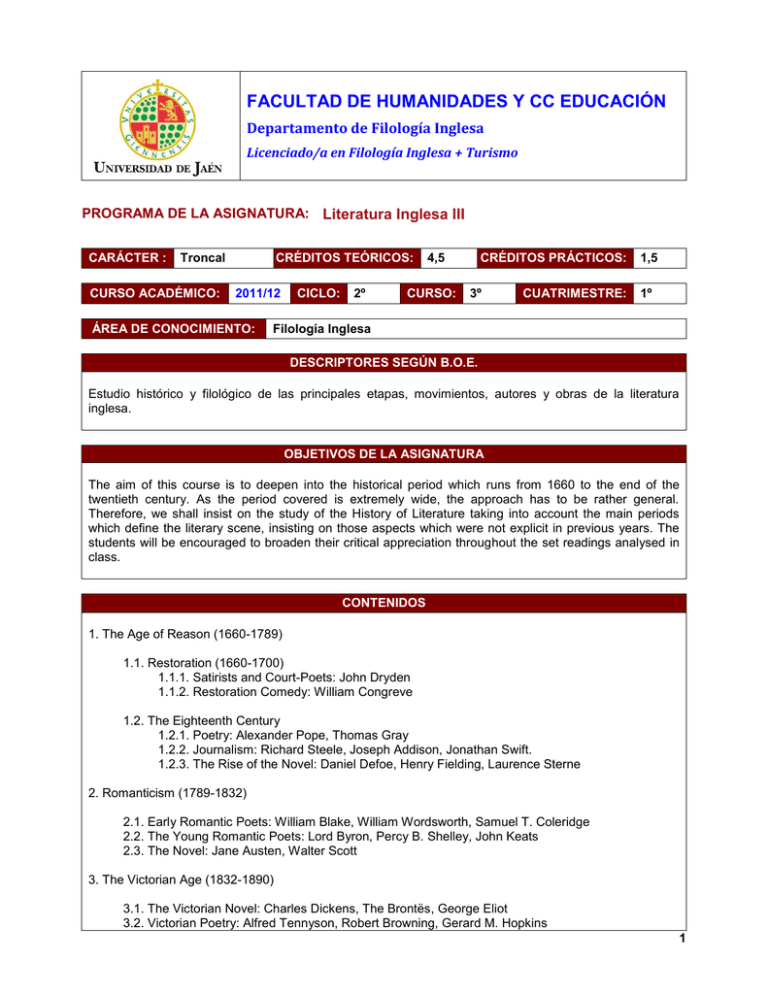
FACULTAD DE HUMANIDADES Y CC EDUCACIÓN Departamento de Filología Inglesa Licenciado/a en Filología Inglesa + Turismo PROGRAMA DE LA ASIGNATURA: Literatura Inglesa III CARÁCTER : Troncal CURSO ACADÉMICO: CRÉDITOS TEÓRICOS: 2011/12 ÁREA DE CONOCIMIENTO: CICLO: 2º 4,5 CURSO: CRÉDITOS PRÁCTICOS: 3º CUATRIMESTRE: 1,5 1º Filología Inglesa DESCRIPTORES SEGÚN B.O.E. Estudio histórico y filológico de las principales etapas, movimientos, autores y obras de la literatura inglesa. OBJETIVOS DE LA ASIGNATURA The aim of this course is to deepen into the historical period which runs from 1660 to the end of the twentieth century. As the period covered is extremely wide, the approach has to be rather general. Therefore, we shall insist on the study of the History of Literature taking into account the main periods which define the literary scene, insisting on those aspects which were not explicit in previous years. The students will be encouraged to broaden their critical appreciation throughout the set readings analysed in class. CONTENIDOS 1. The Age of Reason (1660-1789) 1.1. Restoration (1660-1700) 1.1.1. Satirists and Court-Poets: John Dryden 1.1.2. Restoration Comedy: William Congreve 1.2. The Eighteenth Century 1.2.1. Poetry: Alexander Pope, Thomas Gray 1.2.2. Journalism: Richard Steele, Joseph Addison, Jonathan Swift. 1.2.3. The Rise of the Novel: Daniel Defoe, Henry Fielding, Laurence Sterne 2. Romanticism (1789-1832) 2.1. Early Romantic Poets: William Blake, William Wordsworth, Samuel T. Coleridge 2.2. The Young Romantic Poets: Lord Byron, Percy B. Shelley, John Keats 2.3. The Novel: Jane Austen, Walter Scott 3. The Victorian Age (1832-1890) 3.1. The Victorian Novel: Charles Dickens, The Brontës, George Eliot 3.2. Victorian Poetry: Alfred Tennyson, Robert Browning, Gerard M. Hopkins 1 4. The Coming of Modern Age (1890-1930) 4.1. Tendencies in the novelists 4.1.1. Imperialism: Joseph Conrad, Rudyard Kipling 4.1.2. Pessimism: Thomas Hardy 4.1.3. Liberalism: H. G. Wells 4.2. Innovations in the novel: D. H. Lawrence, Virginia Woolf, James Joyce 4.3. Poetry 4.3.1. First World War Poets: Rupert Brooke, Wilfred Owen 4.3.2. William B. Yeats 4.3.3. Modernism: Thomas S. Eliot 4.4. The New Drama 4.4.1. Oscar Wilde 4.4.2. The Influence of Ibsen: George Bernard Shaw 5. To the Present Day (1939-) 5.1. Narrative 5.1.1. The Utopian Novel: Aldous Huxley, George Orwell 5.1.2. Evelyn Waugh, Graham Greene 5.1.3. Women Novelists: Doris Lessing, Iris Murdoch 5.1.4. Transcultural writing 5.2. Poetry 5.2.1. Post-Romanticism: Dylan Thomas 5.2.2. Philip Larkin 5.2.3. Seamus Heaney 5.3. Post-War Drama: 5.3.1. John Osborne 5.3.2. Absurd Drama: Samuel Beckett, Harold Pinter ACTIVIDADES EN QUE SE ORGANIZA BIBLIOGRAFÍA BÁSICA 8 Abrams, M. H. (ed.) (2006 ). The Norton Anthology of English Literature, vols. 1 & 2. London: Norton [1962]. 2 Carter, R. & J. McRae (2001 ). The Penguin Guide to Literature in English: Britain and Ireland. Harlow: Penguin/Pearson [1996]. BIBLIOGRAFÍA COMPLEMENTARIA Abrams, M. H. (ed.) (1975). English Romantic Poets: Modern Essays in Criticism. London: O.U.P. Allen, W. (1958). The English Novel: A Short Critical History. London: Penguin. Barnard, R. (1984). A Short History of English Literature. Oxford: Basil Blackwell. Baugh, A. (ed.) (1967). Literary History of England. London: Routledge. Blackburn, J. (ed.) (1986). Hardy to Heaney: Twentieth Century Poets, Introductions and Explanations. Edinburgh: Oliver and Boyd. 2 Blamires, H. (1984). A Short History of English Literature. London: Routledge. Burgess, A. (1974). English Literature. Harlow: Longman. Burton, S. H. (1973). The Criticism of Prose. London: Longman. Burton, S. H. (1974). The Criticism of Poetry. London: Longman. Carter, R. & J. McRae (1997). The Routledge History of Literature in English. London: Routledge. Cohan, S. (1991). Telling Stories: A Theoretical Analysis of Narrative Fiction. London: Routledge. Cuddon, J. A. (1984). A Dictionary of Literary Terms. New York: Penguin. Daiches, D. (1969). A Critical History of English Literature, vols. 3 & 4. London: Secker and Warburg. Evans, I. (1976). A Short History of English Literature. Harmondsworth: Penguin. Ford, B. (1984). The New Pelican Guide to English Literature. Harmondsworth: Penguin. Forster, E. M. (1976). Aspects of the Novel. London: Penguin. Fowler, A. (1987). A History of English Literature. Oxford: Blackwell. Gill, R. (1985). Mastering English Literature. Houndmills: Macmillan. Gower, R. (1990). Past into Present: An Anthology of British and American Literature. London: Longman. Hewitt, D. (1988). English Fiction of the Early Modern Period 1890-1940. London: Longman. Hidalgo, P. (1981). La literatura inglesa en los textos. Madrid: Alhambra. Hobsbaum, P. (1996). Metre, Rhythm and Verse Form. London: Routledge. Kenshall, M. (1985). Studying Drama: An Introduction. London: Routledge. Leguois, E. (1934). A Short History of English Literature. Oxford: Clarendon Press. Manlove, C. (1989). Critical Thinking: A Guide to Interpreting Literary Texts. London: Macmillan. May, D. J. & L. A. Hill (1975). A New Introduction to English Literature. London: O.U.P. McDowall, David (1989). An Illustrated History of Britain. Harlow: Longman. McEwan, N. (1984). Preparing for Examinations in English Literature. Essex: Longman. Ousby, I. (ed.) (1988). The Cambridge Guide to Literature in English. Cambridge: C.U.P. Probyn, C. T. (1984). English Poetry. Essex: Longman. Probyn, C. T. (1987). English Fiction of the Eighteenth Century: 1700-1789. London: Longman. Richards, B. (1988). English Poetry of the Victorian Period: 1830-1890. London: Longman. Richards, J. A. (1967). Principles of Literary Criticism. London: Routledge. Roberts, P. D. (1991). How Poetry Works: The Elements of English Poetry. London: Penguin. Sampson, G. (1970). The Concise Cambridge History of English Literature. Cambridge: C.U.P. Stephen, M. (1984). An Introductory Guide to English Literature. Essex: Longman. Verdonk, P. & J. J. Weber (ed.) (1995). Twentieth Century Fiction: From Text to Context. London: Routledge. Watson, J. R. (1985). English Poetry of the Romantic Period: 1789-1830. London: Longman. Watt, I. (1987). The Rise of the Novel: Studies in Defoe, Richardson and Fielding. London: The Hogarth Press. Westlend, P. (ed.) (1950). The Teach Yourself History of English Literature. London: English University Press. Wheeler, M. (1985). English Fiction of the Victorian Period: 1830-1890. London: Longman. Williams, J. (1985). Reading Poetry. London: Edward Arnold. PROCEDIMIENTO DE EVALUACIÓN A final exam will include theoretical questions, questions on the readings and commentary. An oral exam is also recommended. In all the cases this will involve answers in the form of compositions. Only those students who reveal an adequate mastery of the English language can hope to be successful. Al tratarse de una asignatura a extinguir y, por lo tanto, sin posibilidad de evaluar el progreso diario de los alumnos, el examen teórico-práctico supondrá el 100% de la calificación final. CRITERIOS DE EVALUACIÓN Term papers on topics which will be indicated to students at the appropriate moment are also required. 3 The purpose of these papers is to enable students to put into practice the ideas and techniques gained during work in class and, as such, they constitute a form of continuous assessment of each student’s progress. 4
